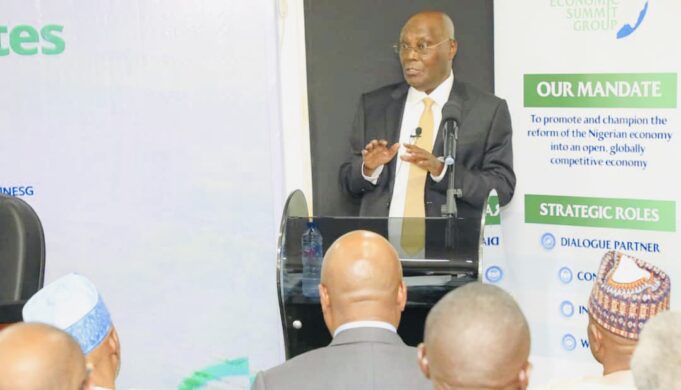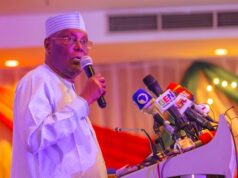The presidential candidate of the Peoples Democratic Party (PDP), Atiku Abubakar, has vowed to enhance electricity supply in the country if elected as president in the 2023 general election.
Atiku said his administration would initiate and implement an Emergency Power Programme (EPPs) to increase electricity supply within the first year in office.
The former Vice President equally promised to propose legislation for the removal of electricity value chain from the exclusive list and allow states to generate, transmit, and distribute electricity for themselves.
He said this at the Nigeria Economic Summit Group (NESG) Presidential Dialogue on the Economy in Lagos on Monday.
The PDP presidential candidate said his administration, if elected in 2023, would incentivise private investor to invest in the entire electricity value chain while the Federal Government focuses on policy, regulation, and standardisation.
Atiku said: “As a short-term measure to ensure enhanced power supply I shall, within the first year of the new administration, initiate and implement an Emergency Power Programme (EPPs) that can deliver additional capacity in certain key areas.
READ ALSO: Atiku: It’s risky to hand over Nigeria’s future to Tinubu
“Over the medium term, I will propose legislation for the removal of the entire electricity value chain from the exclusive list and give states the power to generate, transmit and distribute electricity for themselves.
“It is counter-productive and injurious to let an industrial dispute with the Federal Government in Abuja to affect an industry in Lagos or a factory in Aba or Kano or even an average Nigerian who simply desires to get home, watch the news and sleep under a ceiling fan.
“Investments in additional generation capacity will be accompanied by complementary investments in transmission and distribution infrastructure to wheel the additional energy. These would be done with private sector support and investments.
“We shall incentivise private investor to invest in the entire electricity value chain while the Federal Government focuses on policy, regulation, and standardization. A tariff structure for operators, which reflects costs, will be one of such incentives.
“We will stimulate growth to create jobs and wage war against hunger. The economy must grow for economic opportunities to abound,” he stated.
The former Vice President noted that poverty reduction would be the centrepiece of his economic development agenda, adding that economic performance would be measured by the number of jobs created and the number of people lifted out of poverty rather than by the amount of money spent.
“Early in our administration, we will create an Economic Stimulus Fund with an initial investment capacity of approximately $10 billion to prioritize support to MSMEs across all the economic sectors.
“I will undertake far-reaching fiscal restructuring to improve liquidity as well as the management of our fiscal resources. We shall attract investments in the oil and gas sector, enhance revenues, including through reduction of oil theft. We shall also take steps to increase non-oil revenues.
“In that regard, we will undertake an immediate review of government spending with a view to eliminating all leakages arising from subsidy payments, especially subsidy on petroleum products.
“We will also stop all fiscal support to ailing state-owned enterprises.
“We will improve spending efficiency by gradually reducing government recurrent expenditures. Over the medium term, recurrent expenditures should not exceed 45% of the budget.
“We will also review government procurement processes to ensure value-for-money and eliminate all leakages. As Vice President, I championed the enactment of the public procurement law, which gave rise to the ‘Due Process’ office.
“And we shall focus on non-debt financing by promoting a private sector-led infrastructure development fund for the financing and delivery of key infrastructure projects.
“We will further reduce the rate of debt accumulation by promoting more Public Private Partnerships in critical infrastructure funding and identifying more innovative funding options.
“We will review the country’s debt strategy by focusing on concessional and semi-concessional sources with lower interest rates and relatively long-term maturity. The government must reduce the issuance of short-dated debt instruments,” Atiku said.










